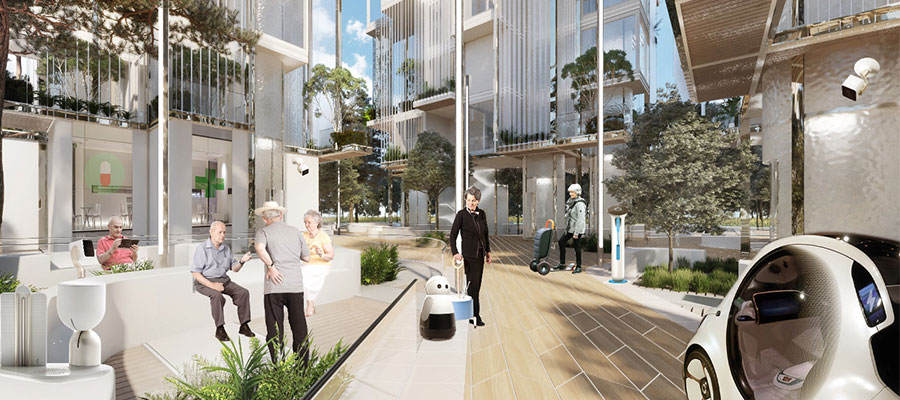Agile Ageing Alliance (AAA) is a joining of innovators from across the building and housing sectors, as well as health, care, design & technology and finance advisors who have come together to produce a new way of retirement living. Neighbourhoods of the Future from the AAA is a vision which modern methods of construction (MMC) can make a reality, providing much-needed affordable homes in multi-generational developments.
Here, Ian Spero – founder of Agile Ageing Alliance – answers editor Victoria Galligan's questions on how MMC can help to solve the housing crisis.
Modern methods of construction Q&A with Ian Spero

How did you get involved with health care and housing?
My first real exposure to health and social care was observing my dad caring for my mother while she did her utmost to hold incurable cancer at bay for six precious years.
Like most lay carers my father learned on the job. He had been a chartered surveyor, so this was all very new and at times quite scary. When my mother passed she left a gaping hole in my dad’s, then 82-year-old, life.
Dad was lucky, he had a strong support network of family, friends and neighbours who were there to help him come to terms with life in a big old, suddenly very empty, house.
But, what about those less fortunate? When I was subsequently invited to join Innovate UK and help lay the groundwork for a revolution in long term care and dependency, I jumped at the opportunity.
This is still a significantly underdeveloped sector, with considerable scope for social, business and technological innovation that will enable older adults – even those with high level physical and/or cognitive requirements – to remain in their own home, rather than a setting run on institutional principles.
That said, in a world where social networks are leading to a pandemic of loneliness, we need to look at the ageing society challenge holistically and reimagine housing within the context of ‘smart’ neighbourhoods. Neighbourhoods are the settings where residents can socialise, realise common values, and achieve a level of social control and purpose.
How many more homes are needed in the UK for the elderly?
Today, there are more than 11 million people aged 65 and over in the UK, by 2035, there will be 17 million.
According to the Local Government Association, we are looking at a shortfall of more than 400,000 units of housing for older people by 2030.
Why is MMC a good choice compared to traditional methods?
Modern Methods of Construction (MMC), emerging ‘smart’ technologies and big data analytics present possibilities for everyone. However, their potential impact on the way people, especially older adults, engage with the built environment is relatively unexplored.
The UK is facing an acute housing shortage. A better use of modern construction processes and materials could fix this, enabling thousands more homes to be built faster, cheaper and more efficiently; potentially transforming the quality and specificity of UK housing. Yet as things stand, our dependence on bricks and mortar defines a sector that is technologically moribund.
Writing in the AAA Neighbourhoods of the Future 2019, report – commissioned by Tata Steel, Kieran Singleton Co-founder, of automotive design specialists Forge Design says there are lessons to be learned from the successes of the automotive industry: “Car manufacturers first recognised the benefits of platform manufacturing decades ago. To make better products more affordable, it is standard practice to try and maximise the amount of inter-vehicle commonality. This level of standardisation could have led to a conveyor belt of similar products and a huge reduction in user choice. But, by aspiring to great design, manufacturers have taken advantage of the platform approach to deliver exciting new concepts, embraced by the public at both ends of the price spectrum.”
Matt Cooper, a leading advocate for MMC at Arup, is even more bullish “The creative pioneers of the new generation of MMC not only have the opportunity to alleviate our housing shortage, but to change the way housing is delivered across the social spectrum. With adaptable and agile regeneration capabilities built in by design, within the next 10-20 years, MMC may not only halt the downward spiral in our housing market, but act as the catalyst for a new social economy.”
What is the benefit for people with mobility needs?
Making our homes more accessible to people with mobility needs is a pre-requisite for an ageing population.
New build housing and indeed retrofit homes can be made more accessible – and safer – by replacing steps with slopes/ ramps, installing grabrails/ handrails, compact lifts, floor coverings etc. Lighting can be improved to illuminate risk areas. The bathroom is a top hazard area with regard to falls injury and could benefit from the use of use of non-slip flooring, accessible baths, better lighting, taps and shower installation. An adaptable kitchen, where units can be lowered for easy reach from wheelchairs, can be installed. Digital assistive technology solutions has huge potential to improve lives. This will range from new forms of robotics and digital health systems, to installation of sensors, alarm systems, automated use of environmental controls, and/or innovative use of more mainstream systems such as Alexa etc.
Critically, these improvements, need to be well designed. There is no need for ugly fixtures and fittings, better suited to a hospital than a home.
How can enough units be constructed to meet this growing need?
A wholesale commitment to MMC and the aims and aspirations outlined in our aforementioned report could make a substantive difference at scale. Local authorities around the country are keen to do things differently. By way of example, in Coventry an independent developer, Regents Regeneration, is planning to build a pioneering multigenerational neighbourhood. The Regents scheme includes building a factory outside of the City to construct the new homes off-site. Regents is also working with Coventry University to incorporate a teaching facility addressing a growing skills shortage in the construction market.
- Log in to post comments














